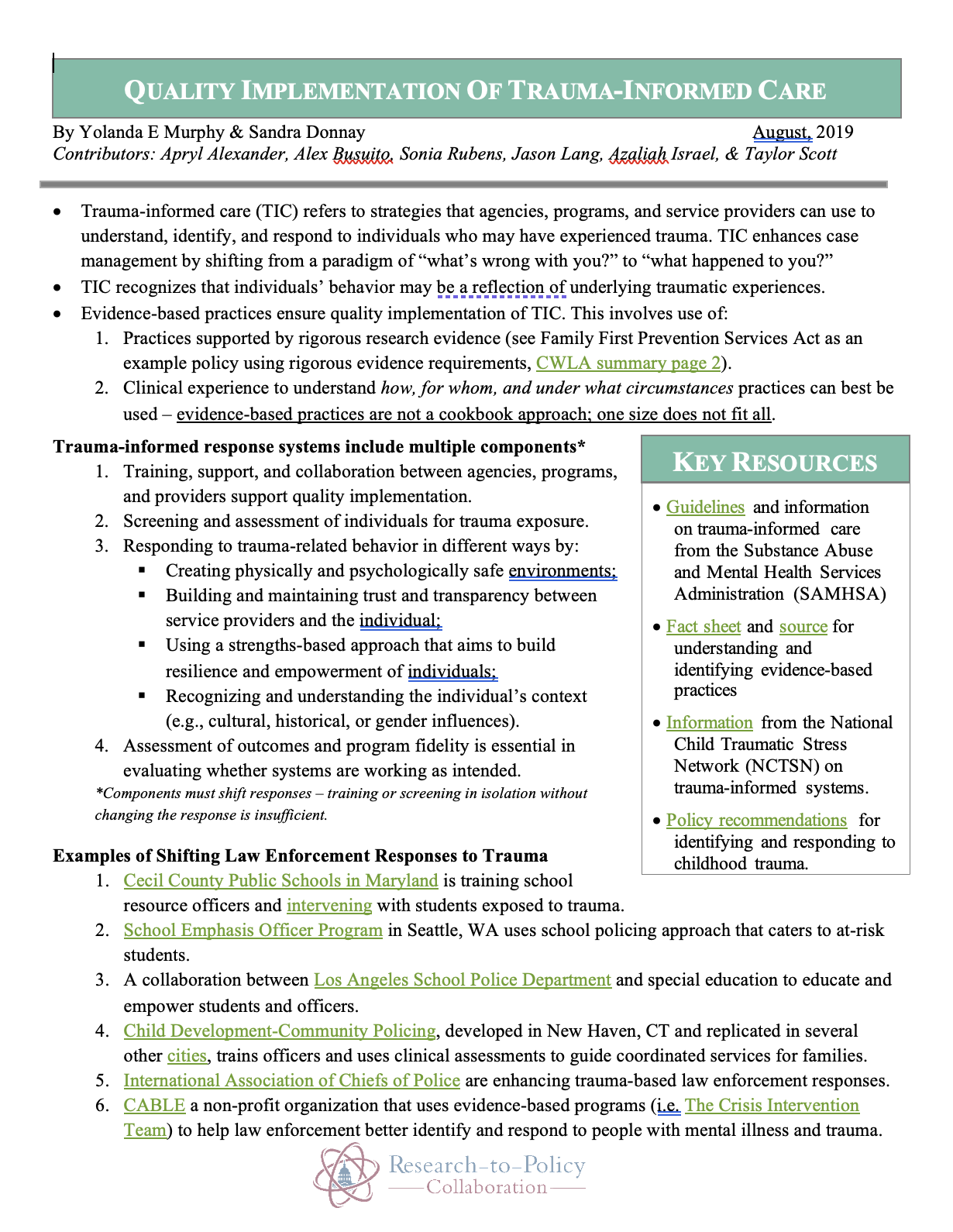
- Trauma-informed care (TIC) refers to strategies that agencies, programs, and service providers can use to understand, identify, and respond to individuals who may have experienced trauma. TIC enhances case management by shifting from a paradigm of “what’s wrong with you?” to “what happened to you?”
- TIC recognizes that individuals’ behavior may be a reflection of underlying traumatic experiences.
- Evidence-based practices ensure quality implementation of TIC. This involves use of:
-
- Practices supported by rigorous research evidence (see Family First Prevention Services Act as an example policy using rigorous evidence requirements, CWLA summary page 2).
- Clinical experience to understand how, for whom, and under what circumstances practices can best be used – evidence-based practices are not a cookbook approach; one size does not fit all.
Trauma-informed Response Systems Include Multiple Components*
- Training, support, and collaboration between agencies, programs, and providers support quality implementation.
- Screening and assessment of individuals for trauma exposure.
- Responding to trauma-related behavior in different ways by:
- Creating physically and psychologically safe environments;
- Building and maintaining trust and transparency between service providers and the individual;
- Using a strengths-based approach that aims to build resilience and empowerment of individuals;
- Recognizing and understanding the individual’s context (e.g., cultural, historical, or gender
*Components must shift responses – training or screening in isolation without changing the response is insufficient.
Examples Of Shifting Law Enforcement Responses To Trauma:
International Association of Chiefs of Police are enhancing trauma-based law enforcement responses.
- Cecil County Public Schools in Maryland is training school resource officers and intervening with students exposed to trauma.
- School Emphasis Officer Program in Seattle, WA uses school policing approach that caters to at- risk students.
- A collaboration between Los Angeles School Police Department and special education to educate and empower students and officers.
- Child Development-Community Policing in Charlotte, NC trains officers and uses clinical assessments to guide coordinated services for children and families.
- CABLE is a law enforcement agency using an evidence-based program; (i.e., The Crisis Intervention Team) and trauma-informed training to better identify and respond to people with mental illness.
Key Resources
- Guidelines and information on trauma-informed care from the Substance Abuse and Mental Health Services Administration (SAMHSA)
- Fact sheet and source for understanding and identifying evidence-based practices
- Information from the National Child Traumatic Stress Network (NCTSN) on trauma-informed systems.
- Policy recommendations for identifying and responding to childhood trauma.
The Research-to-Policy Collaboration (RPC) works to bring together research professionals and public officials to support evidence-based policy. Please visit their website to learn more.
Key Information
RPC Website
Research-to-Policy Collaboration
Publication DateAugust 1, 2019
Topic Area(s)Social Services, Education and Child Development, Health, Violence and Victimization
Resource TypeWritten Briefs
Share This Page
- Trauma-informed care (TIC) refers to strategies that agencies, programs, and service providers can use to understand, identify, and respond to individuals who may have experienced trauma. TIC enhances case management by shifting from a paradigm of “what’s wrong with you?” to “what happened to you?”
- TIC recognizes that individuals’ behavior may be a reflection of underlying traumatic experiences.
- Evidence-based practices ensure quality implementation of TIC. This involves use of:
-
- Practices supported by rigorous research evidence (see Family First Prevention Services Act as an example policy using rigorous evidence requirements, CWLA summary page 2).
- Clinical experience to understand how, for whom, and under what circumstances practices can best be used – evidence-based practices are not a cookbook approach; one size does not fit all.
Trauma-informed Response Systems Include Multiple Components*
- Training, support, and collaboration between agencies, programs, and providers support quality implementation.
- Screening and assessment of individuals for trauma exposure.
- Responding to trauma-related behavior in different ways by:
- Creating physically and psychologically safe environments;
- Building and maintaining trust and transparency between service providers and the individual;
- Using a strengths-based approach that aims to build resilience and empowerment of individuals;
- Recognizing and understanding the individual’s context (e.g., cultural, historical, or gender
*Components must shift responses – training or screening in isolation without changing the response is insufficient.
Examples Of Shifting Law Enforcement Responses To Trauma:
International Association of Chiefs of Police are enhancing trauma-based law enforcement responses.
- Cecil County Public Schools in Maryland is training school resource officers and intervening with students exposed to trauma.
- School Emphasis Officer Program in Seattle, WA uses school policing approach that caters to at- risk students.
- A collaboration between Los Angeles School Police Department and special education to educate and empower students and officers.
- Child Development-Community Policing in Charlotte, NC trains officers and uses clinical assessments to guide coordinated services for children and families.
- CABLE is a law enforcement agency using an evidence-based program; (i.e., The Crisis Intervention Team) and trauma-informed training to better identify and respond to people with mental illness.
Key Resources
- Guidelines and information on trauma-informed care from the Substance Abuse and Mental Health Services Administration (SAMHSA)
- Fact sheet and source for understanding and identifying evidence-based practices
- Information from the National Child Traumatic Stress Network (NCTSN) on trauma-informed systems.
- Policy recommendations for identifying and responding to childhood trauma.
The Research-to-Policy Collaboration (RPC) works to bring together research professionals and public officials to support evidence-based policy. Please visit their website to learn more.

Key Information
RPC Website
Research-to-Policy Collaboration
Publication DateAugust 1, 2019
Topic Area(s)Social Services, Education and Child Development, Health, Violence and Victimization
Resource TypeWritten Briefs
Share This Page
LET’S STAY IN TOUCH
Join the Evidence-to-Impact Mailing List
Keep up to date with the latest resources, events, and news from the EIC.




